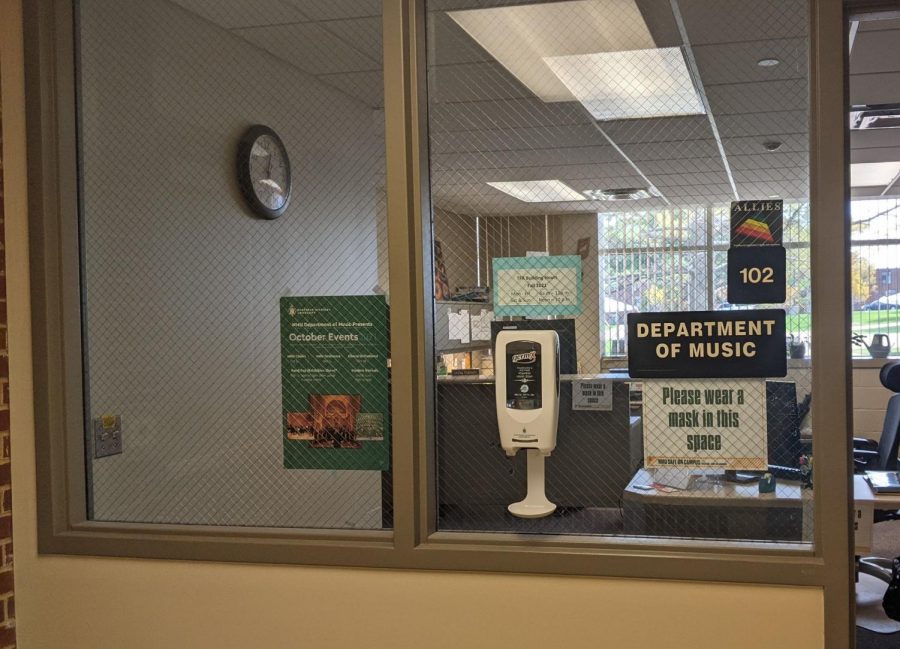New music major creates more opportunities for students
MUSIC MAJORS – The NMU department of music recently created a new major, music industry, to help students entering into the world of music administration and business. The idea for the major was inspired by student stories who graduated from NMU with a music major.
October 5, 2021
In the fall 2020 semester, the NMU Music Department offered a new major called music with elective studies in an outside field, or music industry for short, to enable students to focus more on the production, promotion or business sides of music.
In the past, the department offered a bachelor’s degree in music and a bachelor’s in music education. With the new music industry major, students still take music classes, but they also choose to focus their studies on one of four concentrations: music management, entrepreneurship, marketing & publicity, or multimedia production.
Mark Flaherty, head of the music department, said when students pursue a music degree, their careers often go in a lot of different directions. The music industry major provides students a greater versatility when they enter the workforce.
“That’s sort of the whole thing with this—trying to give students skills and opportunities that are going to make them that much more marketable later on and allow them to pursue their own careers,” Flaherty said.
Flaherty said that most music students, no matter the major, graduate with the need to market themselves or do other jobs still related to music while finding that perfect fit. This new degree helps students pursue more practical opportunities and even more training, including an internship requirement.
In degrees like music or liberal arts, people often question the practicality of making a career of it, said Flaherty.
“This [music industry major] tries to address that a little bit in terms of saying: you get this music degree and there are some real-world skills that you could potentially add to that,” Flaherty said.
Some of the classes involved with this major are focused on more commercial music styles such as jazz. Core classes that would normally be taken in a BS or BA major have been stripped down, like earlier music history courses. Other introductory music courses like MU222 Basic Jazz Improvisation and MU128 Musical Notation Software, which are usually not required in the other majors, are required for this major.
This major also requires classes from other disciplines depending on the chosen path, including accounting classes, management, financing and more.
Flaherty recalled two former music major students whose experiences after graduation ultimately helped inspire the creation of the music industry major. One was a student who played the saxophone and after graduation, ended up doing a lot of instrument repair and created his own business. Another student chose to double major in music and marketing and eventually helped with events at the John F. Kennedy Center of Performing Arts in Washington D.C.
It was stories like this that made the music department collectively start to consider if they needed to supply a degree for students to help them reach those kinds of goals. They submitted the music industry major request to the Curriculum Undergraduate Program in 2018.
“Our thought is ‘could we make it easier for somebody … who wants to do this? Could we give them a track that allows for this to happen?'” Flaherty said.
One of the students that chose to follow the music industry major is junior Chloe Hall. She originally started as a music major and then switched to music industry once the major was offered.
“I wasn’t for sure set on what I wanted to do, but when I heard they were offering it, I knew that was the route I was supposed to take,” Hall said.
Hall works at Jim’s Music in Marquette where she helps teach music classes and manages other teachers there.
“I enjoy being part of a managerial role whether it be in a classroom or behind the scenes during shows,” Hall said. “I want to be involved with music every day, whether that be in the action with the music or managing the musicians and their concerts.”
Currently the major is only one year old, so most students majoring in it right now are still taking core music classes. Flaherty said that it is still very much a music degree, just one that allows for more flexible application.
“If you love music, if you love being involved in the arts I think it’s definitely a worthwhile way to spend your life,” Flaherty said.


























